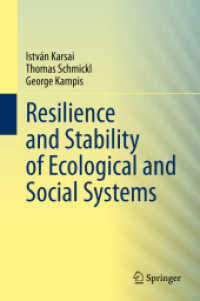- ホーム
- > 洋書
- > 英文書
- > Politics / International Relations
Full Description
Neoliberal globalisation is understood to have a corrosive effect on the state. Reductions in economic regulatory capacities combined with an ideological attack on the public necessity of social spending has left many with the impression that the state is a weakened institution, at best. This book argues that global capitalism actually requires state institutional authority, but the legitimation of this authority is increasingly tied to cultural rather than economic means. Canada and Quebec are presented examples of how neoliberal states achieve integration.
Contents
Acknowledgments
Tables and Figures
Part One: Introduction
1. Globalization, Neoliberalism, and the Rasputin State
2. Legitimating State Authority in an Age of Neoliberal Globalization
Part Two: Historical Background
3. Canada: History and the Quest for National Identity
4. Québec: History and the Centrality of National Identity
Part Three: Economic Globalization, Labor Migration, and Social Integration
5. The Global Market Economy: History and Impact on Canada and Québec
6. Ethnic Diversification and Labor Migration
7. Multiculturalism, Interculturalism, and the Changing Definition of National Culture
8. The Importance of Culture in Neoliberal State-Building
Bibliography








